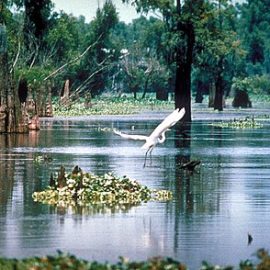
The republicans cheered the court ruling against the EPA but it is a ruling that will hurt the state and its citizens.
In the national screaming and cheering June 30 when the conservative majority on the U.S. Supreme Court ruled only Congress can regulate greenhouse gas emissions from coal-fired power plants, Louisianans might have missed another sound. It was the hammering of perhaps the last few nails into a watery coffin for most of the state’s bottom third. Here’s why. First: The original goals of Louisiana’s Coastal Master Plan are now likely unachievable, and state it may have to quickly switch to managed retreat. Second: There is now little more than 30 years left for an affordable — hence livable — future for the landscape below I-10. Third: Most of the politicians elected by Louisiana voters cheered this outcome.
nola.com
The ruling was not a surprise as the courts, including those in the past, have favored business over citizens.
The ruling wasn’t a big surprise. These judges seldom like agencies creating industrial regulations not specifically spelled out by Congress. Now, you might think the very name of this agency — Environmental Protection — gives it authority to address the greatest environmental threat in human history. But the court’s six conservatives decided this case involved an emerging legal theory called the “major questions doctrine.” This maintains that when a proposed regulation is of “economic and political significance,” the court must make sure Congress specifically authorized an agency to act. And they judged a regulation making power plants ditch coal could cost industry so much money, it required congressional authority.
You might say that the need is there to do what the EPA did.
You might now be screaming: “Hey, what about the lasting impacts these emissions are already having on the 320 million people living in this nation! Isn’t that of ‘economic and political significance!?’” Well, these conservative justices have ruled time and again they believe a corporate citizen’s right to “life, liberty and pursuit of happiness” trumps that of mere human citizens. A simple solution is obvious: Congress can pass a bill telling the EPA it wants emissions from coal and other sources reduced. But that’s exactly why this ruling puts a dark cloud on Louisiana’s future. Since the 2017 master plan, we’ve known reducing emissions is the key to any coastal future here. That’s because emissions drive the warming causing the oceans to rise at ever-accelerating rates. Some estimates have the Gulf rising 2 feet along our coast by 2050 and higher and faster after that. The state already knows that rise will drown much of our planned marsh rebuilding projects in a couple of decades. It also knows the only way to slow that rise is to reduce emissions quickly and dramatically.
Despite this we know that the republicans will not pass environmental bills, they have shown this over the past few years.
But we all know today’s GOP will not allow any climate legislation passed by the House to even come up for a vote in the Senate, much less escape a filibuster. Climate action will move even slower if the GOP takes control of Congress this fall, as widely predicted. And time is Louisiana’s biggest enemy when it comes to coastal survival. “Delay is as dangerous as denial when it comes to emissions and the coast,” said Donald Boesch, the native New Orleanian and eminent coastal scientist. He pointed out the master plan and Gov. John Bel Edwards’ Climate Action Plan are “bookends” for our coastal survival. But both rely heavily on the state and nation transitioning quickly from fossil fuels. “This ruling,” he said, “may only involve coal, but it’s a green light for the rest of the petrol-chemical industry to file suit over emissions regulations. That means delays, and that changes everything we have planned.” That also means a very short life span for Louisiana’s bottom third.
We know this as well and yet the state’s congressional delegation is overall not working in the citizens benefit.
But here’s the sick irony in this story: Key politicians Louisianians pay to protect their interests applauded the decision. For example, House Minority Whip Steve Scalise, who represents the most threatened area of the country to sea level rise, cheered this reprieve for industry at the expense of his constituents. His comments were typical across the GOP. There are still avenues for President Joe Biden to proceed on climate action in other areas, but anyone who reads the science understands what delays means for Louisiana. And people living here should remember who put the judges there that made this decision.
it shows we need to vote for those who will work for us.


